|
We have entered the season of Advent and a new liturgical year. Advent offers us an important time for us to watch, wait, and reflect on the coming of Jesus Christ, on our encounter with him. He is encountered in the mystery of the Incarnation, which we represent by Nativity scenes placed in our churches, chapels, and homes. We can stop at the beauty of the artistic scene and not move ourselves into deeper reflection on the fact that God, who is infinite love and mercy, sent his only begotten Son to save us.
Christ is also encountered in the Eucharist, most significantly during the celebration of the Mass. Pope Francis describes this coming of Jesus: “Mass is prayer; rather, it is prayer par excellence, the loftiest, the most sublime, and at the same time the most ‘concrete’. In fact, it is the loving encounter with God through his Word and the Body and Blood of Jesus. It is an encounter with the Lord.” (General Audience, November 15, 2017). And Christ will come again in all his glory at the end of time. We need to be prepared for this time not simply through passive waiting, but by active watching for the Lord and encountering him in our brothers and sisters who are most in need, especially the poor, the vulnerable, and the voiceless (Mt. 25:31-46). As baptized members of the Body of Christ, we are co-responsible for the mission that he left us until he comes again – for the salvation of souls – not only focusing on eternal life with God, but also on how we are collaborating with the Most Holy Trinity to build the Kingdom of God on this side of life. Pope Francis reminds us of the connection of the Immaculate Conception to the salvific plan of God. “In the Immaculate Conception of Mary we are invited to recognize the dawn of the new world, transformed by the salvific work of the Father and of the Son and of the Holy Spirit. The dawn of the new creation brought about by divine mercy. For this reason, the Virgin Mary, never infected by sin and always full of God, is the mother of a new humanity. She is the mother of the recreated world.” (Homily for the Solemnity of the Immaculate Conception, 2015) We have not been conceived without sin, but we have been washed clean of Original Sin at Baptism (and all prior sin, if one was baptized as an adult). While we have all sinned since that time, our Baptism offers us a share in the mission of Jesus Christ as Priest, Prophet, and King. Though followers or disciples, he also sends us as apostles, or as missionary disciples, out into our challenging world to witness to him by what we say and do. That is why we are told at the end of each Mass to “Go”. We are sent on mission by Christ and the Church as joyful witnesses of God’s love and mercy. Our best example of how to be a missionary disciple of Jesus Christ is the Blessed Virgin Mary. She followed Jesus as his disciple unfailingly during her life and continues from her heavenly home as Queen of Apostles to invite us to encounter her Son, Jesus Christ, Our Savior and Lord. May the Charity of Christ urge us on! The Catholic Apostolate Center is a ministry of the Immaculate Conception Province of the Society of the Catholic Apostolate (Pallottine Fathers and Brothers). The Pallottines and the Center staff will remember you in special prayer on this Solemnity of the Immaculate Conception.
0 Comments
“I looked into my deepest wound and was dazzled by your glory.” – St. Augustine of Hippo (attributed) My favorite Gospel passage has always been Mark 3:2-5: “And they watched him, to see whether he would heal him on the sabbath, so that they might accuse him. And he said to the man who had the withered hand, ‘Come here.’ And he said to them, ‘Is it lawful on the sabbath to do good or to do harm, to save life or to kill?’ But they were silent. And he looked around at them with anger, grieved at their hardness of heart, and said to the man, ‘Stretch out your hand.’ He stretched it out, and his hand was restored.” Why did Jesus ask this man to stretch out his hand? Didn’t He know there were people around who would be able to see what was probably this man’s greatest insecurity? Didn’t He understand that this man had been judged and ridiculed enough throughout his life? That his deformed hand—and himself—was looked upon with disgust? Why would Jesus ask him to stretch it out, being all the more visible to the crowd around him? Jesus could have easily healed his hand while it was still hidden. Why cause more pain? Of course, Jesus was aware of the people around him who could see this man’s deformity. In this moment, however, the man with the withered hand probably felt like the only person in the room. What was happening between him and Jesus was the creation of an eternal bond, a divine exchange. This man wanted to be healed; who wouldn’t want the Divine Healer to rid us of our imperfections? But Christ asks the man to stretch out his hand so that he could participate in his healing. So that, in essence, he would tell Christ, “Here is my wound. I want to be healed.” So that it would be the work of Creator and created, an exchange of love, a sign of trust, a unification of suffering. Our redemption as Christians is comprised of many things, but the two I see most often are the participation with Christ in our healing by uniting our suffering to His on the Cross and the offering of our suffering for the benefit of another. In each way, we are actively engaging with the Divine Healer to find His strength through our pain and confidence in the midst of our flaws. When we invite God into our wounds, he transforms them. As St. Augustine said in the quote above, we can be dazzled by the glory we find there. As Catholics, we often hear in regards to suffering the phrase “offer it up.” I think this can sometimes belittle what is truly going on. When we sit before God and say “here are my wounds, here is my pain, hurt, and suffering—heal me,” something supernaturally transformative occurs. We are unifying our wounds to Christ’s wounds on the Cross and, wound for wound, are transforming our suffering into an act that is redemptive. When we participate with Christ in our own healing through suffering, Christ takes that free act of love and can use it to not only heal you, but to transform you to be more like Him and help others to also be transformed. How can actively participating in your healing transform others and lessen their suffering? Well, I think it is mostly a mystery. But allow me to unpack what I think occurs. Each amount of suffering offered up is like a quarter being placed in a jukebox. Once inserted, it enables the rest of the room to hear the music. The whole room is transformed. So too by offering your suffering to God, your fellow man can receive the sweetness of your pain and be converted by the beauty of your love freely given. Each contribution to this divine economy enhances the unity of the Mystical Body of Christ. The heavens move, the saints and the angels engage, and the supernatural world comes in contact with the natural, bridging the gap between heaven and earth just a little more. By inviting God into our hurt, giving our suffering to Him for the sake of others, and by showing it boldly like the man with the withered hand, we can participate with our Creator in becoming whole. This is the beauty of our faith—that our suffering is not our end, but rather the avenue by which we grow closer to Christ. After the Post-Synodal Forum in Rome, I had a few days to spend in the Eternal City visiting friends and taking in some of my favorite sights During my time there, I also saw a fair amount of my new friend and co-delegate to the Forum, Brenda Noriega from the Diocese of San Bernardino in California. I had been to Rome before, but Brenda hadn’t, so my time in Rome was a new experience in many ways. As we made our way into St. Peter’s Square during Brenda’s first time in the Vatican, she mentioned how it seemed as though most of the people there were tourists as opposed to pilgrims. She wasn’t wrong. As we made our way into St. Peter’s Basilica, we experienced deep prayerful encounters at the tomb of Pope St. John Paul II and in the Adoration Chapel of St. Peter’s, but we couldn’t help noticing the constant click of cameras around us and the onslaught of tour groups. Brenda was, understandably, taken aback by the reality that the city that is at the heart of our faith seemed to be more of a museum than a place of pilgrimage I have a love-hate relationship with the Eternal City, but what I love is the art, the history, and the architecture. Sharing that experience of Rome with Brenda made me think, “How often do we treat our faith and our experience of it as a museum and not an experience of miracle?” It’s so easy to do in Rome. I love walking around and seeing historic places like St. Peter’s or the Chiesa del Gesù, which is the mother church of the Jesuit order and the first baroque church ever built. The Gesù is known best for its trademark baroque façade, its ceiling painting (the Triumph of the Name of Jesus by Baccicio), the beautiful gold gilding, and the tomb of St. Ignatius Loyola as well as the arm of St. Francis Xavier. This time I made a special trip to the relic of St. Francis Xavier to pray for a friend who heads on mission soon, but this prayerful experience wasn’t always my norm. How many times have I walked into that church and treated it like a museum? The arm of St. Francis Xavier is there because of his immense holiness, but for many (including myself at times) it is nothing but a photo opportunity. The Triumph of the Name of Jesus is painted to display Philippians 2:10 which reads, “that at the name of Jesus every knee should bend, of those in heaven and on earth and under the earth.” But how often did I look at it as if it were the Mona Lisa or just another piece of art in a museum? We might think to ourselves, “I don’t live in Rome, so this can’t happen to me!” How often, though, do we shuffle into Mass expecting to hear stories of a man named Jesus who lived two thousand years ago? When we see our faith as a museum, we miss the miracle. We miss the truth that, as Pope Francis reminds us in Christus Vivit, Christ is alive. The Scriptures aren’t just antiquated books like those that we can find in a library or hall of records, but they are the Word of God truly alive. The Eucharist that we receive is not just bread and wine, but the Body and Blood, Soul and Divinity of Jesus Christ, truly alive. Our faith has history and tradition, that is for sure, but it is not a museum. Our faith is not just a collection of gold chalices, stained glass, historic cathedrals, and antiquated practices, but is truly alive. Our faith, when seen as a miracle, allows us to enter deeper into the depths of the Church, into the depths of Christ and his life, into the depths of the mysteries of the Trinity, and into the depths of our relationship with Christ who is alive and who has come to save us. May our faith always be a lived miracle, never just a museum. For more resources on the Synod on Young People, Faith, and Vocational Discernment, please click here. Are you tired of the feasting? We are at the tail end of feasting after the Easter season with the celebration of the Solemnity of Corpus Christi last Sunday. We experienced the 50 days of Easter, the Solemnity of the Ascension of the Lord, Pentecost, the Solemnity of the Holy Trinity, and finally, the Solemnity of Corpus Christi. In my family, we have partaken in a fair share of feasting on treats, and I am almost ready for a period of fasting again. The transition from the Easter season into Ordinary Time can lead to a misunderstanding of what the Church is calling us to during this liturgical season. It is easy to see Ordinary Time as boring or as a time for laziness, but if we look at the liturgical calendar and journey along with the Apostles in the Scriptures, we can see that it is just the opposite. Reflecting back on the Scriptures read during Lent and the Triduum, we see the disciples’ confusion about what Jesus was preparing them for. He warned them often that He had to suffer, die, and rise, and yet they were still in hiding and unsure of their mission after the crucifixion and Resurrection. Scripture states that they were locked in the Upper Room in fear of the Jews after Christ’s death and then that they were left “looking intently at the sky” after Christ’s Ascension. It is not until Pentecost, when the Holy Spirit descends upon the disciples, that the gift of understanding is given to them and they are able to go forth and spread the Gospel message. In celebrating the Solemnities of the Ascension and Pentecost after Easter Sunday, we come to understand our role as Christians on mission. We are reminded that we too are equipped with the Holy Spirit for the call to go out to all the nations and proclaim the Good News, baptizing in the name of the Trinity. We next celebrate the Solemnity of the Holy Trinity, a day to contemplate that the Holy Trinity is relationship itself, and we are invited into that relational exchange of love among Father, Son and Holy Spirit. As the Catechism explains, "By the grace of Baptism ‘in the name of the Father and of the Son and of the Holy Spirit,’ we are called to share in the life of the Blessed Trinity” (CCC 264). This Solemnity invites us to ponder the vastness and majesty of God in three persons and His great love for His creation. Finally, the Church celebrates the Solemnity of Corpus Christi (Latin for “Body of Christ”). Christ, after the Ascension, remains with us in the bread and wine transformed into His Body and Blood during the celebration of the Mass. This Solemnity focuses our attention and hearts on the greatest gift to the Church: the Body, Blood, Soul and Divinity of our Lord in the Holy Eucharist. Together with the celebration of the other feasts after Easter Sunday, the celebration of Corpus Christi is a moment of grace given to us today that propels us into this season of Ordinary Time. If we look at the calendar, the Church has been preparing our hearts to enter into this celebration of Corpus Christi. We needed Jesus to establish the Eucharist (Holy Thursday), to suffer, die and rise (Triduum), to return to the Father (Ascension), and to send the Church an outpouring of understanding for Her mission through the Holy Spirit (Pentecost). As a result, we can ponder and enter into the life of the Holy Trinity (Solemnity of Holy Trinity). All of these feasts prepare the Church for the Solemnity of Corpus Christi and for our journey into Ordinary Time. The Holy Eucharist is the strength for our journey in the ordinary. The Body and Blood of Jesus assists us in following the will of God as we receive God Himself. The Solemnity of Corpus Christi can be celebrated with hope that Jesus is with us in this Holy Sacrament, and the Church is calling us to continued growth in Ordinary Time. Questions for Reflection: How can you use Ordinary Time in order to grow in your faith? What graces from Lent and Easter can help propel you into Ordinary Time? The beginning of summer is an exciting time. The school year may be done, and more leisurely activities may be planned, but for the ministry of a local church, the work never stops. The sacraments must be administered, the Holy Mass must be celebrated, the sick and dying must be cared for, and those with life’s burdens and clouds of uncertainty must be consoled: the sacred works of ministry never cease. As even our Lord observed, “The harvest is abundant but the laborers are few; so ask the master of the harvest to send out laborers for his harvest.” God calls upon certain men to embrace a unique vocation of humble sanctity, service, and obedience as priests. As such, seeing the result of years—even decades—of discernment and spiritual formation come to fruition is a cause of immense jubilation for a local church. Ordination day, then, gathers the diocese to happily witness the sacred rite through which the bishop consecrates these men into priestly service. And how wonderful such an occasion is— especially for those who have walked with these men—as new spiritual life is breathed into the church.
While recent scandals might cause some to worry or be wary, the celebration of priestly ordination serves as a reminder that God remains with us and never ceases in caring for the needs of his Church. The sinful actions of a few do not negate the sanctity and solemnity of a call to holy priesthood; the standard remains high even though some have acted beneath it. The saying “God is good, all the time; all the time, God is good” serves as a simple but handy reminder of His faithfulness, which is manifested in the ongoing call for certain men to care for the immense needs of His people. As Cardinal Timothy Dolan of New York observed: Is that not good news? Aren’t you tired of hearing about priests who are trouble? Aren’t you fatigued about hearing of priests in scandals? Aren’t you kind of weary [hearing] about priests that have been removed? Don’t you get a little discouraged when you hear about the vocation crisis? Now, all of those are realities; we don’t need to run from them, but I don’t know about you, but I see six new priests who are enthusiastic and eager and raring to go. That gives me a lot of hope and a lot of encouragement. And it’s going to be a high honor for me to ordain them. Discerning how to answer God’s calling to a vocation in your life is an ongoing process, but this does not mean you need to wrestle with it alone. The Church has a wealth of resources to aid in beginning to answer the questions regarding vocational discernment. Spiritual direction is a common method—whether in person or through a treasure trove of books and reflections which have been produced through the centuries and for a Church which has faced a whole spectrum of challenges and threats. God remains with us through it all! Other means of discernment include retreats and talks offered by dioceses and religious communities. And this is also true for those who may be discerning marriage as a vocation. In Holy Scripture, priesthood can be traced back to the Levite tribe of the Israelites, but the family unit is often modeled after the Holy Family, the highest ideal. No matter what your calling in life, God has sanctified it and calls us all to best apply our lives to the service of others through our vocation. Just as the United States has recently commemorated Memorial Day and the countless who have died answering the call to fight for and defend our rights and freedoms, we as a church can come together to appreciate and love our priests, who live to serve the Body of Christ. They have heard and answered the call of the Most High God and trusted in Him to illuminate the path they have been destined to follow in service. They walk with us in faith to celebrate the sacramental life of the Church and comfort those who seek consolation and peace. In supporting our priests and religious—who can be found in parishes, hospitals, cemeteries, battlefields, and schools—we can celebrate with them as their numbers increase during ordinations so as to aid in the beautiful works of holy ministry. For more resources on Vocational Discernment, please click here. . I can recall from a very young age pondering what it means to be Catholic. We were supposed to somehow be different from secular society by the way we lived our lives, but how or why was that any different than simply being a good, kind, and moral human being? Can “normal” domestic life be holy? Why is the domestic church—the Christian family—so vitally important to our faith? Throughout my life, this question has been answered in various ways and degrees. However, nothing has been so powerful as what I have witnessed in the past few months. In the late fall of last year, my mother-in-law underwent unexpected surgery and was unable to attend Mass. During our family’s Thanksgiving visits, I witnessed an incredible moment of our faith: my mother was able to distribute the Sacred Body of our Lord to my mother-in-law. Tears fell from my mother-in-law’s eyes as my husband, father, mother, and I encircled her, reciting prayers together in preparation for the distribution of the Eucharist. I was struck by the immensity of this moment: as I witnessed the woman who gave me life distribute the source of eternal life to the woman who gave my husband life, the depth and vital importance of the domestic church began to come into clearer focus for me. The Christmas season would bring me another unexpected intersection of family and faith and another reminder of the significance of the domestic church. My father was hospitalized between Christmas and New Year’s; I found myself once again in the midst of a family circle of prayer as this time I witnessed my sister ministering the Sacred Body of our Lord to both my father and mother. My husband, nieces, nephew, brother-in-law, and I encircled my father’s hospital bed. Again, I found myself struck by the immensity of the moment unraveling before me; there is something very profound in witnessing the physical, tangible presence of Christ enter into vulnerable family space. I held these moments in my heart and in my mind, reflecting on them as the days rolled by between the holidays and the beginning of Lent. This year, our parish announced that they are encouraging families to consecrate themselves to the Holy Family. Ah, the Holy Family, the perfect model of the domestic church! It is within the context of the family that we learn about our faith and see examples of faith lived out. Christ Himself was born into a family; it was a vital part of his plan of salvation. We are each called to sainthood and each of our paths to sainthood will look a bit different. Lent is a beautiful time to really evaluate how close we are to following that path and what we can do in our lives to stay the course. No matter what path our calling leads us on, all paths lead back to the family—whether that be our own family by blood or our brothers and sisters in the faith. How do we live out each day as a domestic church and bring that holy reverence to our everyday lives? We are called not only to love one another but to LIVE for one another. I witnessed this profoundly over the holidays when I saw different members of my family live for and serve one another. But there are also opportunities being presented throughout our everyday life to grow in holiness and spiritual maturity—especially now during this Lenten season. Lent is not only a time to deny ourselves of those things that keep us from our path to sainthood but also a time to invite the Holy Spirit to open our eyes and hearts to opportunities of everyday holiness and saintly domesticity. Christ wants to be a living presence in our homes and in our families, but we have to open the door for Him and invite Him in. I saw the effects of Christ’s presence in my family in those moments when He was brought physically to my parents and mother-in-law. Christ brings unity, service, strength, love. Just as in our physical lives we can manage the stresses and craziness of ever day life better when we fuel our body with proper nutrition and exercise, so too are we called to fuel our spirits and our family bonds with the Bread of the angels and on every word that comes forth from the mouth of God. What spiritual exercises can we work through together as a family this Lenten season? How can we work to call one another to a life of saintly domesticity? For more resources to accompany you throughout your Lenten journey, please click here. To learn more about Marriage and Family, please click here. The word vocation comes from the Latin “vocare,” which means to be called. Like any call, we are offered a choice to answer or ignore it. Assisting others in discerning their apostolic vocation in life was an important aspect of the ministry of the Catholic Apostolate Center’s patron, St. Vincent Pallotti. Pallotti had a great belief in apostleship and what the Church today refers to as the “universal call to holiness.” Many years before the Second Vatican Council formally addressed the role of the laity in the Church, Pallotti understood deeply that each member of the Body of Christ plays a significant role in evangelization. This included the active participation of the laity in collaboration with priests and religious. As the Union of the Catholic Apostolate stated in a 2012 reflection, “Saint Vincent Pallotti was the first to show that the laity on their part share different talents and vocations, possess hidden treasures, and should be employed in the work of evangelization, of edification and of sanctification.” All of this work comprises our vocation, and is what I’m referring to when I speak of our vocation with a little “v.” Before we can begin to think about whether God is calling us to religious life, marriage, or the celibate single life (known as our Vocations with a capital “v”), we must first look to live out the calling he gives all of us: holiness. I was raised outside of the Church. As a result, I wasn’t exposed to our beautiful faith (outside of my baptism) until high school. It wasn’t until three years into my high school career that I began to see religion, which had forever been just a class to me, as being something worth pursuing. Yet in high school, I more deeply came to understand Jesus’ words in Mark 2:17, “It is not those who are healthy who need a physician, but those who are sick; I did not come to call the righteous, but sinners." A life of apostleship, which will lead to the better discernment of our Vocation, is not one of perfection, but of accompaniment and relationship building. We accompany others as they live out their vocation. Similarly, we are accompanied, which helps us keep going when we fall. Our vocation is not something that we choose when to live out, but rather it is an essential and fundamental part of our lives as Christians. As baptized members of the faithful, we are called to live out our baptismal offices of priest, prophet, and king. To live out this call to holiness we must begin with prayer. Prayer, as St. Vincent Pallotti said, “consists in directing all one’s thoughts, words, and actions on God.” In fact, we should pray so much that we “pray without ceasing.” That means that we are living lives that are so full of God, so full of doing his will, that all of our actions, words, and thoughts become a prayer. It can be helpful to remember that prayer is a dialogue. Sometimes we talk and other times we are silent, waiting to hear the voice of God in whichever ways he decides to speak to us. Secondly, we live out our vocations of holiness by living a life of doing good and avoiding evil. This comes from practicing charity with our neighbors and with ourselves and from opening our hearts to those around us who Pope Francis would say are “at the margins.” Through the living out of our vocation, we help others to encounter Christ. This encounter is at the heart of our faith. As Pope Benedict XVI said, “Being Christian is not the result of an ethical choice or a lofty idea, but the encounter with an event, a person, which gives life a new horizon and a decisive direction.” Lastly, we must take part in the sacraments. God’s plan for our salvation is rooted in Christ, whose grace is poured out in all of the sacraments. We should receive the Eucharist, spend time in Adoration, and frequently receive his mercy in the Sacrament of Reconciliation. We have been given all of the tools necessary for living lives of holiness. Those tools are strengthened when we receive the sacraments. So how does living out holiness, our lowercase vocation, pertain to our Vocation? I would argue that living out our Vocation, the call to religious life, priesthood, marriage, or the celibate single life, is one of the highest achievements of living out our vocation. A marriage cannot thrive, for example, without love, hope, mercy, prayer, and kindness. Neither would the ministry of a priest or religious sister. When we truly see the beauty of the promises of Christ: salvation, freedom, mercy, and redemption, we naturally want to know how best to achieve and share them with others. When we understand our call to holiness, and live out our vocations, uppercase and lowercase “v,” then we will help to become saints and build the Kingdom of God. For more resources on Vocational Discernment, please click here. In Matthew’s gospel, chapter 16, Jesus asks his disciples, “Who do people say that the Son of Man is?” The disciples reply that some say John the Baptist, Elijah, Jeremiah, or another prophet. When Christ presses them further, “But who do you say that I am?” Simon Peter steps forward and answers, “You are the Christ, the Son of the living God.” Christ, responds:
“Blessed are you, Simon son of Jonah. For flesh and blood has not revealed this to you, by my heavenly Father. And so I say to you, you are Peter, and upon this rock I build my Church.” As Simon names Christ, Christ renames Simon. Simon’s recognition of Christ’s identity merits him a new identity, both by name, and by acceptance into God’s family. Simon, once son of Jonah, becomes Peter, child of God, disciple of Christ, the rock of the Church. Our Christianity—our proclamation that Jesus Christ is Lord—brings forth a new identity in all of us. The process first begins at baptism. On our behalf, our parents and godparents echo the sentiments of Peter through a profession of faith while the priest, describes our new identities through the words of the baptismal rite (emphases mine):
“You have become a new creation, and have clothed yourself in Christ. See in this white garment the outward sign of your Christian dignity. With your family and friends to help you by word and example, bring that dignity unstained into the everlasting life of heaven.” Not only does the baptismal garment symbolize the state of our souls, freed from original sin, but it also reflects on the nature of clothing as a sign of identity. A priest in his collar, an athlete in his uniform, a mother with a diaper bag slung over her shoulder - what we put on our bodies says something about who we are. During our baptism, we are clothed with Christ - the pure and spotless victim, symbolized by a pure and spotless garment. The white of our baptismal garments also represents the invitation of Christ to all people, regardless of race, ethnicity, social status, or gender. Despite the divisions we impose on one another through our many secondary identities, Christ makes no distinctions among the members of his Father’s house. As St. Paul says in his letter to the Galatians: “For all of you who were baptized into Christ have clothed yourselves with Christ. There is neither Jew nor Greek, there is neither slave nor free person, there is not male and female; for you are all one in Christ Jesus.” Our primary identity in Christ is universal and unified. So, what does our identity in Christ mean for us in the day to day? The baptismal rite covers that too. “With your family and friends to help you by word and example, bring that [Christian] dignity unstained into the everlasting life of heaven.” St. James puts it a slightly different way: “Be doers of the word and not hearers only, deluding yourselves. Religion that is pure and undefiled before God and the Father is this: to care for orphans and widows in their affliction and to keep oneself unstained by the world.” To the best of our abilities, as members of God’s family we must do two things: care and keep. Care: Be a doer of the word! Who needs your help? Ask God to show you who the orphans and widows are in your life, i.e., who needs you to provide something for them, whether it is material, emotional, or spiritual support. At some point, YOU will be a widow or orphan for someone else. When that time comes, ask God for the humility to accept help. Keep: Keep spotless your baptismal garment! Avoid the near occasion of sin, and when you don’t, repent and start over. Go to confession, receive the Eucharist, and spend as much time as you can in prayer. Grow close to Christ through your own sanctification. These directives from the baptismal rite and St. James depend on one another. The closer you are to Christ, the more you will serve his people. The more you serve his people, the closer you are to Christ. Notice that the baptismal rite specifies that you need the help of your “family and friends” to maintain your Christian dignity. You’re not in this alone. You have an entire community of believers behind you. Let’s be doers of the word together. The call to evangelize is at the heart of our Christian faith. We are evangelizers at our core; it makes up our very identity. And yet, if I were to ask most people sitting in the church pews at Mass if they are evangelists, they would probably shake their heads and identify themselves in other terms: vocation, occupation, role in the family, country of origin. A professor of mine in graduate school put it starkly when he said most of the laity are experiencing an “identity crisis.” We do not know, or have forgotten, who we are as members of the Body of Christ and what our role is within it. Today, Pope Francis echoes his predecessors in reminding the laity of their call to become missionary disciples. This is a call that originates from God Himself, with the Risen Christ saying to his beloved disciples before ascending to the Father, “Go and make disciples of all nations.” These words reverberate ever more powerfully for us today. Though the universal call to holiness and a greater emphasis on evangelization has roots in the papacy of Pope Paul VI and within the Second Vatican Council, Pope Francis calls the concept of sharing our encounter with Jesus Christ using the means available to us “missionary discipleship.” It is a profound concept that Pope Francis assures us is relatively simple. “The new evangelization calls for personal involvement on the part of each of the baptized,” he writes in Evangelii Gaudium. “Every Christian is challenged, here and now, to be actively engaged in evangelization; indeed, anyone who has truly experienced God’s saving love does not need much time or lengthy training to go out and proclaim that love.” Once we have encountered Jesus Christ and His merciful love, we are called to bring that encounter to others, therefore playing a unique role in salvation history. Several of my colleagues from the Catholic Apostolate Center and I were honored to discuss “The Call to Missionary Discipleship” at the Catechetical Day hosted by the Archdiocese of Washington in late October. We discussed that, as baptized Christians, we have been given the grace of Jesus Christ in order to respond to the both daunting and exhilarating call to “go out to all the nations.” This understanding of evangelization subsists not only on our personal encounter with God’s transforming love, but also on our proclamation of it. It is not enough to encounter Jesus Christ for ourselves. Like the woman at the well, we must go forth telling anyone who will listen, “Come see a man who told me everything I have done.” Below are five practical tips we came up with for living out the call to be a missionary disciple. What are we missing? Feel free to add to our list by commenting on our post below! 1. Collaboration If we are to be missionary disciples, we must be people of collaboration. This does not mean that we attend endless meetings, join committees, or fill every moment of our schedule. We propose collaboration from the beginning, which means a willingness to begin an endeavor communally with others—recognizing the valuable role each person has. Collaboration must happen among, for, and with those in our parishes and organizations. It requires openness to the promptings of the Holy Spirit, humility, dialogue, and flexibility. How can you learn from others in your community, parish, family, workplace, or neighborhood? How might God use the gifts and talents of a diverse group of people to strengthen His kingdom on earth? 2. Technology As followers of Jesus Christ, we are called to use the tools of this present age in order to re-present the Gospel to our world in a way that is innovative and re-invigorated. A major tool today that can be used to spread the Gospel message is technology, especially the internet. We can share digital content that is valuable, such as Scripture, the Catechism, and Papal and Conciliar documents, in order to become better informed about our faith. Technology can also create a new type of community, enabling us to connect with others and share information in a way that is cost-effective and not limited to physical proximity. What are some ways you can use technology to spread the Gospel and help build a civilization of love? 3. Community/Parish Life We do not exist in isolation. As Christians, our work of evangelization will not bear much fruit if we do it alone. Our community, especially our parish, strengthens us and equips us to go outside our church walls in order to evangelize. It is within the parish that we receive the sacraments, especially the Eucharist, which gives us the grace of Christ Himself. In order to be effective as missionary disciples, we are called to have a vibrant sacramental life strengthened by our communities. How does your parish community strengthen you for your mission of discipleship? 4. Relationships Relationships outside of the parish are also crucial to missionary discipleship. As mentioned above, we do not exist in isolation. Do we have a mentor or spiritual guide helping us to grow in our faith life? Do we have relationships or friendships that hold us accountable and push us to become better witnesses of faith? By developing faith-filled relationships and surrounding ourselves with mentors and guides, we ensure that we continue to grow in our role as missionary disciples. 5. Prayer Prayer is crucial not only to a life of missionary discipleship, but to the Christian life overall. Prayer is the foundation for our relationship with God, inviting us to get to know ourselves more deeply through his gaze of love and mercy and helping us to better understand our specific mission in building up the Body of Christ. Prayer can, and should be, both personal and communal. God speaks in the silence of our hearts, as well as through others. Are we carving out time in silence to converse with God and hear the promptings of the Holy Spirit? Do we read Scripture, pray the Rosary, journal, sing hymns, or reflect? By having an active prayer life, we will be better equipped to become fruitful missionary disciples. The call to missionary discipleship is both daunting and exciting, and we can live it out at any time. As Pope Francis wrote in Evangelii Gaudium, “Being a disciple means being constantly ready to bring the love of Jesus to others, and this can happen unexpectedly and in any place: on the street, in a city square, during work, on a journey.” Above, I’ve listed a few tips to fulfilling our call to become missionary disciples. What would you add to the list? Editor's note: This post was originally published in November 2017. Since its publication, the Catholic Apostolate Center has expanded its vision and resources for living as missionary disciples. Please see our "Living as Missionary Disciples" resources page and our 2017 e-book Living as Missionary Disciples: a Resource for Evangelization that was produced in collaboration with the USCCB. Lately, I have been reflecting on discipline as an important element of discipleship. What does the word discipline mean to you? Commitment, application, diligence, resolve, zeal, conscientiousness; these are all synonyms of the word discipline. Discipline and its synonyms imply a persistence, a willingness to do something difficult over and over in order to achieve a goal or to serve some purpose. Am I a dedicated disciple of Jesus Christ who is willing to discipline myself, physically and spiritually, body and soul, to be the best version of myself? Am I committed to using that self for the glory of Christ’s work on earth?
More often than not, the secular fitness industry attempts to convince people to be concerned with disciplining their bodies for aesthetic reasons. You should eat right, exercise, and get enough sleep so that your body conforms to a certain standard of beauty. The implication is that people who conform to this standard of beauty feel better about themselves, are admired more by other people and are more successful in life—but what if we cared about the health of our bodies because it was also bound up in the health of our souls? Scripture teaches us that the human body is made in the image of God, which the Catechism explains that “it is a human body precisely because it is animated by a spiritual soul” (CCC 364). This means that our bodies are not just our bodies: they are ensouled. That doesn’t mean that the body is just a container for the soul. Rather, “the unity of soul and body is so profound that one has to consider the soul to be the ‘form’ of the body: i.e., it is because of its spiritual soul that the body made of matter becomes a living, human body; spirit and matter, in man, are not two natures united, but rather their union forms a single nature” (my emphasis, CCC 365). The soul and the body are uniquely bound. The “form” of the soul organizes and determines the “matter” of the body—just as a collection of wooden planks can be organized by the form of “ship” or “house”. Thinking about all of this within the context of healthy living, understanding our human nature as the union of body and soul can help us to recognize the spiritual importance of caring for our material bodies. What if we took a walk, fueled our body with proper nutrition, or went to the gym because we knew that it would keep us more energized, focused, and alert to fulfilling God’s work on earth? The bodies that we have been given are a gift from God, and much like the rest of creation, it is our task to faithfully steward them. One way that we can live as faithful stewards of our bodies is to invite God into our daily choices. We can pray for the strength to take care of our bodies and when it feels like making a healthy choice is too difficult, we can offer up the sacrifice for someone else. The next time you are debating on whether to spend some time focusing on improving your bodily health, make the decision to offer the sacrifice of your time and energy for a specific intention. The intention can be for a family member, an acquaintance, a close friend, or perhaps a special intention that you are struggling with. “Offering it up” for another person is a form of “intercessory prayer,” which “leads us to pray as Jesus did” to God the father on behalf of others (CCC 2634). Offering the pain and suffering of bodily discomforts is a good way to continually remind yourself that your body is intimately connected to your spirit. Using your body for prayer is not a new idea in the Church. As Catholics, our worship and our sacraments are very sensorial. We cross ourselves, we kneel at the most important parts of Mass like the Consecration, and we use sacramentals like incense and holy water to orient ourselves in prayer to God. We should ask ourselves whether we are using our bodies properly during the spiritual activities of our week. Do we allow ourselves to be fully present and attentive at Mass by folding our hands in prayer and using our eyes to gaze upon the consecrated Body and Blood of Christ? When we genuflect or make the Sign of the Cross, do we muddle through the motions or do we execute each movement deliberately and with reverence? When we prepare ourselves for scriptural reflection or meditation, are we aware of the physical ways that we can help our bodies and brains to relax and focus so that we can bring all of our attention and faculties to Christ? Why should we be concerned with this idea of body AND soul? Our body and soul were designed as one; when we forget one for the other we are not living fully in service to our Lord. Let us use our bodies and souls in action and deed as one instrument for the Glory of God. Question for Reflection: How can I make my prayer more reverent by using my body? Who are they people in my life for whom I can offer up physical discomfort? We have entered the season of Advent and a new liturgical year. Advent offers us an important time to watch, wait, and reflect on the coming of Jesus Christ and on our encounter with him. He is encountered in the mystery of the Incarnation, which we represent by Nativity scenes placed in our churches, chapels, and homes. We could limit ourselves to only looking at the beauty of the artistic scene and not move into deeper reflection on the fact that God, who is infinite love and mercy, sent his only begotten Son to save us.
Christ is also encountered in the Eucharist, most significantly during the celebration of the Mass. Pope Francis describes this coming of Jesus: “Mass is prayer; rather, it is prayer par excellence, the loftiest, the most sublime, and at the same time the most ‘concrete’. In fact, it is the loving encounter with God through his Word and the Body and Blood of Jesus. It is an encounter with the Lord.” (General Audience, November 15, 2017). And Christ will come again in all his glory at the end of time. We need to be prepared for this time not simply through passive waiting, but by active watching for the Lord and encountering him in our brothers and sisters who are most in need, especially the poor, the vulnerable, and the voiceless (Mt. 25:31-46). As baptized members of the Body of Christ, we are co-responsible for the mission that he left us until he comes again – for the salvation of souls – not only focusing on eternal life with God, but also on how we are collaborating with the Most Holy Trinity to build the Kingdom of God on this side of life. Pope Francis also reminds us of the connection of the Immaculate Conception to the salvific plan of God. “In the Immaculate Conception of Mary we are invited to recognize the dawn of the new world, transformed by the salvific work of the Father and of the Son and of the Holy Spirit. The dawn of the new creation brought about by divine mercy. For this reason, the Virgin Mary, never infected by sin and always full of God, is the mother of a new humanity. She is the mother of the recreated world.” (Homily for the Solemnity of the Immaculate Conception, 2015) We have not been conceived without sin, but we have been washed clean of Original Sin at Baptism (and all prior sin, if one was baptized as an adult). While we have all sinned since that time, our Baptism offers us a share in the mission of Jesus Christ as Priest, Prophet, and King. Though followers or disciples, he also sends us as apostles, or as missionary disciples, out into our challenging world to witness to him by what we say and do. That is why we are told at the end of each Mass to “Go”. We are sent on mission by Christ and the Church as joyful witnesses of God’s love and mercy. Our best example of how to be a missionary disciple of Jesus Christ is the Blessed Virgin Mary. She followed Jesus as his disciple unfailingly during her life and continues from her heavenly home as Queen of Apostles to invite us to encounter her Son, Jesus Christ, Our Savior and Lord. May the Charity of Christ urge us on! The Catholic Apostolate Center is a ministry of the Immaculate Conception Province of the Society of the Catholic Apostolate (Pallottine Fathers and Brothers). The Pallottines and the Center staff will remember you in special prayer on this Solemnity of the Immaculate Conception. The call to evangelize is at the heart of our Christian faith. We are evangelizers at our core; it makes up our very identity. And yet, if I were to ask most people sitting in the church pews at Mass if they are evangelists, they would probably shake their heads and identify themselves in other terms: vocation, occupation, role in the family, country of origin. A professor of mine in graduate school put it starkly when he said most of the laity are experiencing an “identity crisis.” We do not know, or have forgotten, who we are as members of the Body of Christ and what our role is within it. Today, Pope Francis echoes his predecessors in reminding the laity of their call to become missionary disciples. This is a call that originates from God Himself, with the Risen Christ saying to his beloved disciples before ascending to the Father, “Go and make disciples of all nations.” These words reverberate ever more powerfully for us today. Though the universal call to holiness and a greater emphasis on evangelization has roots in the papacy of Pope Paul VI and within the Second Vatican Council, Pope Francis calls the concept of sharing our encounter with Jesus Christ using the means available to us “missionary discipleship.” It is a profound concept that Pope Francis assures us is relatively simple. “The new evangelization calls for personal involvement on the part of each of the baptized,” he writes in Evangelii Gaudium. “Every Christian is challenged, here and now, to be actively engaged in evangelization; indeed, anyone who has truly experienced God’s saving love does not need much time or lengthy training to go out and proclaim that love.” Once we have encountered Jesus Christ and His merciful love, we are called to bring that encounter to others, therefore playing a unique role in salvation history. Several of my colleagues from the Catholic Apostolate Center and I were honored to discuss “The Call to Missionary Discipleship” at the Catechetical Day hosted by the Archdiocese of Washington in late October. We discussed that, as baptized Christians, we have been given the grace of Jesus Christ in order to respond to the both daunting and exhilarating call to “go out to all the nations.” This understanding of evangelization subsists not only on our personal encounter with God’s transforming love, but also on our proclamation of it. It is not enough to encounter Jesus Christ for ourselves. Like the woman at the well, we must go forth telling anyone who will listen, “Come see a man who told me everything I have done.” Below are five practical tips we came up with for living out the call to be a missionary disciple. What are we missing? Feel free to add to our list by commenting on our post below! 1. Collaboration If we are to be missionary disciples, we must be people of collaboration. This does not mean that we attend endless meetings, join committees, or fill every moment of our schedule. We propose collaboration from the beginning, which means a willingness to begin an endeavor communally with others—recognizing the valuable role each person has. Collaboration must happen among, for, and with those in our parishes and organizations. It requires openness to the promptings of the Holy Spirit, humility, dialogue, and flexibility. How can you learn from others in your community, parish, family, workplace, or neighborhood? How might God use the gifts and talents of a diverse group of people to strengthen His kingdom on earth? 2. Technology As followers of Jesus Christ, we are called to use the tools of this present age in order to re-present the Gospel to our world in a way that is innovative and re-invigorated. A major tool today that can be used to spread the Gospel message is technology, especially the internet. We can share digital content that is valuable, such as Scripture, the Catechism, and Papal and Conciliar documents, in order to become better informed about our faith. Technology can also create a new type of community, enabling us to connect with others and share information in a way that is cost-effective and not limited to physical proximity. What are some ways you can use technology to spread the Gospel and help build a civilization of love? 3. Community/Parish Life We do not exist in isolation. As Christians, our work of evangelization will not bear much fruit if we do it alone. Our community, especially our parish, strengthens us and equips us to go outside our church walls in order to evangelize. It is within the parish that we receive the sacraments, especially the Eucharist, which gives us the grace of Christ Himself. In order to be effective as missionary disciples, we are called to have a vibrant sacramental life strengthened by our communities. How does your parish community strengthen you for your mission of discipleship? 4. Relationships Relationships outside of the parish are also crucial to missionary discipleship. As mentioned above, we do not exist in isolation. Do we have a mentor or spiritual guide helping us to grow in our faith life? Do we have relationships or friendships that hold us accountable and push us to become better witnesses of faith? By developing faith-filled relationships and surrounding ourselves with mentors and guides, we ensure that we continue to grow in our role as missionary disciples. 5. Prayer Prayer is crucial not only to a life of missionary discipleship, but to the Christian life overall. Prayer is the foundation for our relationship with God, inviting us to get to know ourselves more deeply through his gaze of love and mercy and helping us to better understand our specific mission in building up the Body of Christ. Prayer can, and should be, both personal and communal. God speaks in the silence of our hearts, as well as through others. Are we carving out time in silence to converse with God and hear the promptings of the Holy Spirit? Do we read Scripture, pray the Rosary, journal, sing hymns, or reflect? By having an active prayer life, we will be better equipped to become fruitful missionary disciples. The call to missionary discipleship is both daunting and exciting, and we can live it out at any time. As Pope Francis wrote in Evangelii Gaudium, “Being a disciple means being constantly ready to bring the love of Jesus to others, and this can happen unexpectedly and in any place: on the street, in a city square, during work, on a journey.” Above, I’ve listed a few tips to fulfilling our call to become missionary disciples. What would you add to the list? To learn what the Catholic Apostolate Center is doing to form missionary disciples, click here to learn about Apostles on Mission. “…the Church wants again to state her desire to encounter, accompany, and care for every young person, without exception.” -Pope Francis What is the role of youth and young adults within our Church? How can the Church better listen to their desires, dreams, and needs, and empower them as contributing members of the Body of Christ? What are young people seeking and how can the Church better minister to them during this transformative time in their lives? These are a few of the types of questions asked and discussed at the National Dialogue on Catholic Pastoral Ministry with Youth and Young Adults in Chicago from September 17-19. With representatives from almost fifty Catholic organizations, apostolates, and diocese around the United States, the National Dialogue brought pastoral leaders working with youth and young adults together in order to discuss the future of pastoral ministry to the young church. This dialogue was called for by the United States bishops and co-hosted with the National Federation for Catholic Youth Ministry (NFCYM) and the National Catholic Network de Pastoral Juvenil Hispana (LaRed). The National Dialogue was organized to unify, engage, and mobilize church leaders working with youth and young adults in preparation for the XV Ordinary General Assembly of the Synod of Bishops on “Young People, the Faith, and Vocational Discernment” called for by Pope Francis in Rome in October of 2018, as well as the V Encuentro called for by organizations advocating for Hispanic Ministry. According to their website, “The vision of this initiative is an energized and unified Church committed to forming and engaging youth and young adults as missionary disciples.” The Catholic Apostolate Center was honored to be invited to participate in the National Dialogue this year. As a ministry of the Society of the Catholic Apostolate (Pallottines) - Immaculate Conception Province founded in 2011 to respond to the needs of the church, the Center has worked with and for active young adult Catholics in a variety of ways. Most notably, the Center has developed the ten-week formation program Apostles on Mission in collaboration with the Archdiocese of Washington to help young adults become active evangelizers. As our patron, St. Vincent Pallotti, believed, we are all called to be apostles—what Pope Francis calls missionary disciples. Through efforts such as Apostles on Mission, as well as our online Catholic resources, webinars, podcasts, social media presence and blog, the Catholic Apostolate Center works to revive faith, rekindle charity, and form apostles across all ages and experiences within our Catholic faith. As Pope Francis wrote in the Preparatory Document for the 2018 synod, “Proclaiming the joy of the Gospel is the mission entrusted by the Lord to His Church.” We are excited to see how the collaborative fruits of the National Dialogue help us to fulfill that mission and continue to work to spread the joy of the Gospel each day. In 61 days, I will no longer have my maiden name, will no longer have to mark “single” on tax forms, and will be the happiest girl in the world. This is because I will marry my best friend at our parish in front of our family and friends, and thus become man and wife. But before we’re retired and sitting together on the porch swing celebrating many years of happy marriage, my fiancé and I have some work to do.
The journey of preparing in mind, body, and soul for the vocation of marriage has been an eventful one. Wedding planning isn’t easy. It has tested our patience and our communication skills. But on that Saturday afternoon 61 days away, when we commit ourselves to each other, we are making a statement. In our profession of vows, we will be showing the people in attendance that Christ is a central part of our lives, and that God is at the center of our relationship. Throughout our ceremony, we are inviting our guests to reflect on God’s love for them and to join us in sharing our faith as the Body of Christ. Sacraments are meant to bring people closer to Christ. Those present will witness this sacrament from wherever they are in their walk of life and faith journey, and hopefully have an encounter with God. We look forward to providing a moment of evangelization as missionary disciples through our marriage. My fiancé and I have learned a lot from the example of married friends and family who live out their Catholic faith. One couple that recently welcomed an addition to their family has been instrumental in answering questions we’ve had about what happens next and giving us advice throughout our marital preparation. They’ve helped my fiancé and I better understand what it means to be a young and newlywed couple, juggling jobs, obstacles, and life events, and doing it all with faith in God. They and so many others have shown us what it means to live out marriage with love for God and each other. In the Archdiocese of Washington, two other couples have been examples of commitment and love. Ephraim and Sussie, who have been married for 25 years, and Bob and Laurin, who have been married for 75 years, talk about their love stories and how they cherish each other to this day. Couples like these have had to work hard at their marriage through good times and bad—just as we will. Through it all, they keep God at the center of their relationships. During these next 61 days, I will pray for my future husband, for myself as a wife, and for God’s grace to be present through it all. We will work at our marriage, this is for certain—and it won’t be easy. But with communication, understanding, forgiveness, and prayer, we will make it. During the Pre-Cana course we attended a few months ago, we learned a few things about communication and prayer that I would like to impart to anyone, whether you are in a relationship, have great friendships, or are several years into your marriage. My fiancé helped me create a list of the top ten things that stuck out to us. I hope they help you, too!
For more resources on Marriage and Family, click here. Questions for Reflection: How can the example of married and engaged couples help those discerning marriage? Are there people in your life that you look to as witnesses of fruitful marriage? Now you are Christ’s body, and individually parts of it. –1 Corinthians 12:27 I commute to work every day by train through Chicago’s “loop.” It’s the perfect place for people-watching. Recently, I was on a busy sidewalk when a woman who looked rather tired and disheveled pushed a stroller near the crowd with her child. Behind me were two very elegantly dressed women in a hurry. The woman with the stroller asked the passing crowd, “Can you spare some change for our next meal?” It’s a question that I’ve heard too often downtown. I felt a pang of sadness and guilt. Often, I am unsure how to respond. The women behind me continued on past her and began commenting: “What a horrible mother”; “Of course I’m not going to help her out. Why would I want to give her my money?” Those comments hurt even more than seeing this poor mother and child suffer. In the first letter to the Corinthians, St. Paul writes, “As a body is one though it has many parts, and all the parts of the body, though many, are one body, so also Christ. . . . If [one] part suffers, all the parts suffer with it; if one part is honored, all the parts share its joy.” The mother and her baby, the women behind me, and all those who are a part of my community of friends and family are of one body. As stated in Lumen Gentium, “By communicating His Spirit, Christ made His brothers, called together from all nations, mystically the components of His own Body. In that Body the life of Christ is poured into the believers who, through the sacraments, are united in a hidden and real way to Christ who suffered and was glorified.” We live as one with Christ and with one another even amidst the poverty, injustice, and messiness we experience. This letter from Paul to the early Church deepens their understanding of the Body of Christ and its physical makeup. Each person has a function within it which works alongside the other members and promotes the common good. As the Catechism of the Catholic Church notes, “The unity of the Mystical Body produces and stimulates charity among the faithful.” I often fall into the temptation of removing myself from a group who seems holier than me, those who are more involved in their community or are outspoken in ways that I’m not. I even tend to exclude myself from the community of pedestrians walking down the sidewalk. I forget that we make up the Body of Christ and that if others suffer, I suffer. If others rejoice, I rejoice. I also share a part of myself with each of them. One of my mentors once said, “Our goal is always to connect. Even if it’s uncomfortable, we are made for relationship.” As a Christian, I am called to notice those in the community around me and to connect with them. Mystici Corporis Christi, the encyclical from Pius XII, also outlines the meaning of being a part of the Mystical Body of Christ. “Each member of the Church, of the Mystical Body of Christ, if authentic, is integrally bonded in soul, and hopefully in heart, through the Incarnation, by the Spirit, with Jesus, Son of God, and son of Mary, divine and human,” wrote Msgr. Owen F. Campion. We are bonded in soul and heart because of Christ’s physical and spiritual sacrifice as the Son of God. We become whole in him and in relation to others. As members of the Church, we are called to be a family who loves and cares for others, even those outside of our communities. In all circumstances, the Body of Christ leads me to a holier life. When I am doubtful or uncertain, my faith community allows me to grow. When I’m overwhelmed, others will kindle the fire of faith within me. I fully experience joy when I experience it with others and share the Good News and the love of Jesus. I may do this differently from a trained hand who provides, or a speaker with a gifted tongue, but I’m using my gifts as a member of the Body of Christ. We are called to take part of this community through our unique identity with authenticity. I paused that day on my commute because of this mystical experience of community. I witnessed the pain of the poor mother and child on the Chicago sidewalk, and the harshness of the response of the two women who were walking near me. I became more aware of this truth in the wounds and challenging emotions I experienced. I feel pain because I am connected to all people in some way. Conversely, I can feel joy if I make small choices to build up the Body of Christ. St. Paul outlines this for us, and we hear it in St. Teresa of Avila’s words, “Yours are the hands, yours are the feet, yours are the eyes, you are his body. Christ has no body now on earth but yours.” We must pay attention like Jesus would, and love our physical and mystical body. Questions for Reflection: What unique gifts can I share with others as a member of the Body of Christ? How can I become more aware of the communities I live in? |
Details
Archives
July 2024
Categories
All
|
About |
Media |
© COPYRIGHT 2024 | ALL RIGHTS RESERVED

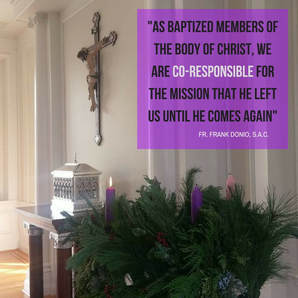
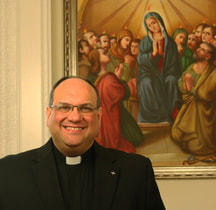
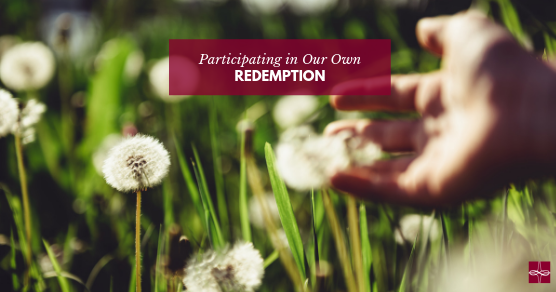

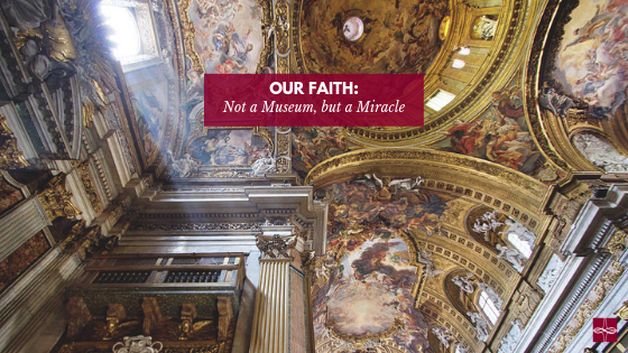

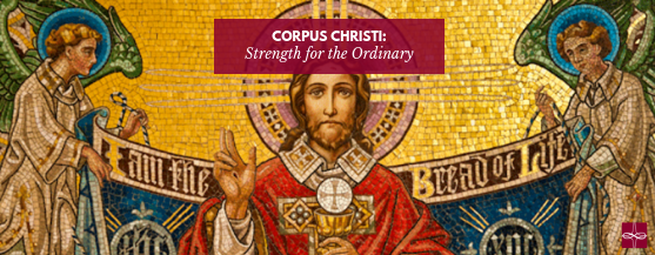

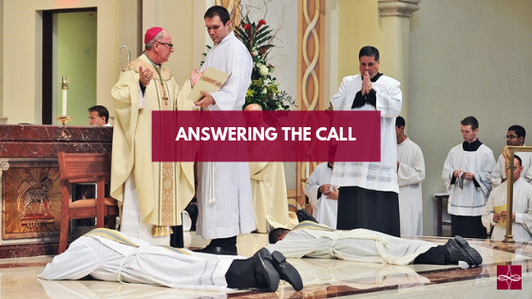



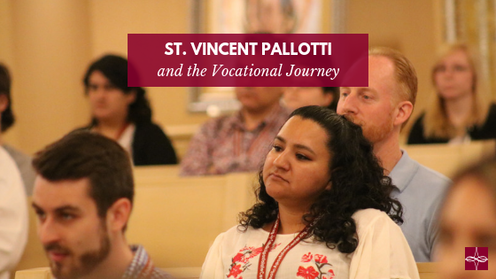

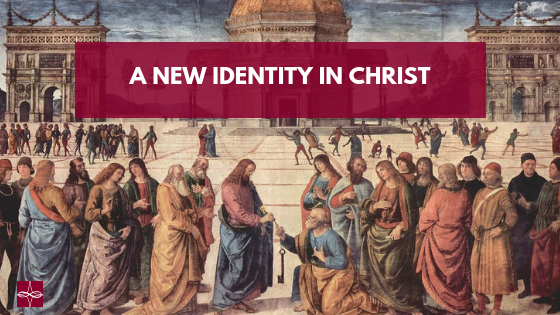



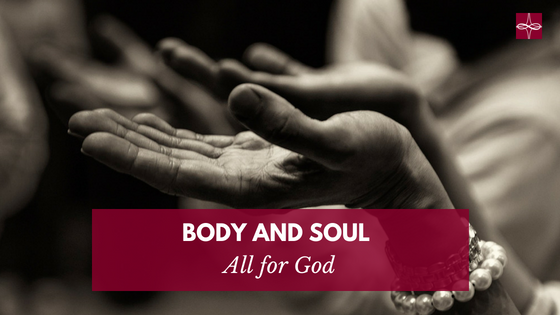

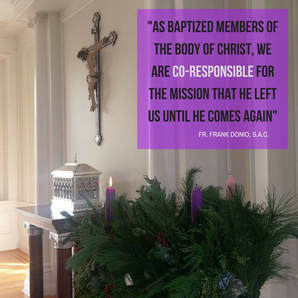
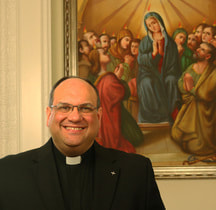






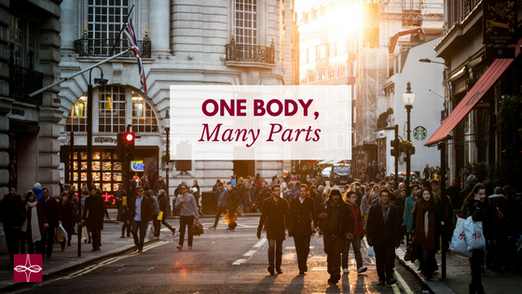

 RSS Feed
RSS Feed